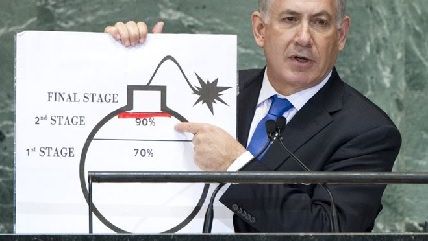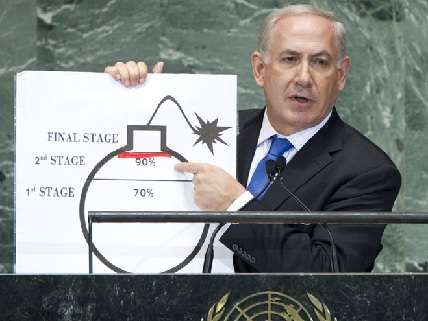Senators Still Pushing Iran Sanctions Even With an Actual Deal on the Table, Reluctant Warmongers Want War
Slouching toward Tehran


Negotiators from Iran and Germany, France, and England (the E3), and later also the US, Russia, and China (the E3+3, or P5+1) have been working on-and-off for more than seven years on a deal about Iran's nuclear program, which the West insists is actually about acquiring nuclear weapons. After a deal appeared just out of reach in a round of negotiations earlier this month, some US senators, most notably Bob Menendez, the Democrat chair of the Senate Foreign Relations Committee, pushed for more sanctions, to show the Iranians the US was not as interested as they were in reaching a deal, a silly argument of which Secretary of State John Kerry was nevertheless unable to disabuse senators interested in a more hostile policy toward Iran.
This weekend, the latest round of talks actually produced a deal, with Iran agreeing within the first six months to stop enriching uranium beyond 5 percent, and to downgrade or eliminate its uranium stockpile that's at near 20 percent enrichment. In exchange, the Western powers agree to a limited lifting of sanctions. As the White House explains, "the overwhelming majority of the sanctions regime, including the key oil, banking, and financial sanctions architecture, remains in place." That's not enough for Senate hawks, Democrat and Republican, who are starting to push, again, for more sanctions. This time, Menendez wants to work on sanctions legislation that somewhat incorporates the recently reached deal—it would "provide for a six month window to reach a final agreement before imposing new sanctions on Iran, but will at the same time be immediately available should the talks falter or Iran fail to implement or breach the interim agreement." Armchair (dais?) tough guy to the last.
Republicans are even more eager to show voters they're tougher than the president on Iran. Marco Rubio, for example, sees an "even more urgent need for Congress to increase sanctions until Iran completely abandons its enrichment and reprocessing capabilities." Establishment Republicans aren't just interested in showing they're more headstrong than President Obama, they may also be trying to isolate non-interventionists in their own party, most notably Kentucky senator and likely future presidential candidate Rand Paul.
It's a bizarre move by establishment Republicans, and Democrats. As recently as late September, 75 percent of Americans favored direct negotiations with Iran over the nuclear issue (even as Obama's poll numbers have plummeted). That number included a full 68 percent of Republicans. The argument that direct negotiations need sanctions to work is specious, as I made the case earlier this month. Attempts by senators to jump the gun on sanctions now, as talks are moving forward, destroy the good faith it was so difficult for negotiators on all sides to build. Americans, too, are weary of war, something the White House has not shied away from pointing out would be the direction increased sanctions and failed talks would push US policy toward.

Bill Kristol takes issue with this, calling it a "smear" to identify politicians pushing policies that would lead to war as "reckless warmongers." He follows this, in typical embellished fashion (the battle of Gettysburg makes an appearance), by noting Israeli prime minister Benjamin Netanyahu would have the "burden of history" hanging over him as he decides whether to launch military action to "thwart" Iran's nuclear ambitions. Polling last year showed fewer than 20 percent of Israelis supporting a unilateral strike. As negotiations have begun to show progress, and Netanyahu has continued to push the argument that the US is wrong to negotiate with Iran in the fashion it has, those numbers have reversed. One poll earlier this month showed 52 percent of Israelis now supporting a solo strike now, with 65 percent opposing the ongoing talks with Iran. Israeli columnist Shlomi Eldar questions the depth of Israeli support for war with Iran. "Israelis should be asked if they are for or against an attack in Iran that could develop into a war with hundreds of casualties," he writes in Al Monitor. "Would 65% of Israelis still vote in favor? I doubt it." The argument of pro-war supporters in Israel, the US, and everywhere in between hinges on how close Iran is to developing a nuclear weapon (Years! Months!), even though intelligence analysts have been predicting Iran being close to the development of a nuclear weapon since at least the late 1990s. Instead of the burdens of history, self-professed reluctant warmongers should consider the burdens of proof.


Show Comments (118)